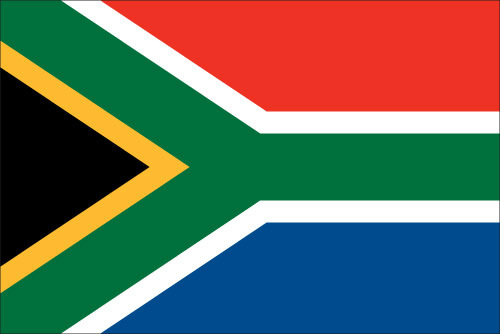
Quick Facts
- South Africa enjoys six distinct floral kingdoms such as the Cape Floral Kingdom which hosts almost 10,000 plant species.
- South Africa is the second leading exporter of fruit in the world.
- South Africa is ranked third on the list of countries with the safest, drinkable water.
- South Africa supplies two-thirds of Africa’s electricity.
- Kruger National Park boasts the greatest variety of wildlife species in Africa.
- About 18% of the population has contracted HIV/AIDS, now largely mitigated due to anitretroviral medications.
South Africa
52 libraries established
South Africa (pop. 60.1 million) gained its independence in 1910. There are eleven official languages including IsiZulu, IsiXhosa, Sotho, Afrikaans, and English, the most common languages. South Africa is roughly one-eighth the size of the United States or five times larger than Britain. The government operates three different capitals, Pretoria (executive), Cape Town (legislative), and Bloemfontein (judicial). Following the 1994 transition to democracy from the system of segregation called apartheid, the South African government created a new constitution. This constitution outlaws any form of discrimination as well as guarantees rights to housing, free education, and health care. South Africa is the only nation in the world to have voluntarily rejected a nuclear defense program.
Education in South Africa: Although the South Africa economy is the most developed country on the continent, it is a land of great socio-economic and educational disparity. This results in a majority of school children being unable to read upon graduating from primary school (grades 1-7). 80% of schools do not have libraries. South Africa allocates seven percent of its annual GDP to education and has one of the highest literacy rates on the continent. The South African Schools Act of 1996 makes schooling mandatory for children ages seven to fifteen.
African Library Project in South Africa: Our first container of 30 libraries was sent to South Africa in 2014. Each village provides the space, furniture, staffing and a library committee. The African Library Project provides books, a training manual, and teacher-librarian training. Throughout this process, we work very closely with our local partner, Lisika Unite Foundation. Lisika Unite, based in Limpopo province, works largely throughout the province and wants to expand further. Our partner vets the projects, coordinates the distribution of books and provides librarian training, and ongoing monitoring and evaluation. Lisika Unite’s unique model converts old barrels, refrigerators, and other usable containers into functional library spaces for use in under-resourced communities. Lisika Unite partners with the Department of Basic Education (SA gov’t) and other local, regional, and international organizations to provide librarian and other training.
Learn More About The Regions We Serve

Kenya
To walk the land of Kenya is to walk the history of humankind. Did you know some of the earliest fossils of prehistoric humans have been discovered in Kenya? A former British colony, Kenya achieved independence in 1963. Since then, the country has seen vast economic growth both in agriculture and technology.
Learn More
Uganda
Uganda, officially known as the Republic of Uganda, is one of the youngest countries on earth with half of its population under the age of 14. Although control of the country passed to the British Colonial Office in 1905, Uganda was never fully colonized.
Learn More
Botswana
Botswana, a former British protectorate, gained independence in 1966. The country’s economy depended primarily on livestock until the 1970s when Botswana became a major exporter of diamonds. Currently, Botswana has one of the most successful economies and stable democracies in Africa.
Learn More
Lesotho
Lesotho is a tiny country nestled in the middle of South Africa. Founded as a kingdom in the 1820s, Lesotho was a British protectorate for almost 100 years before regaining independence in 1966. Today, the country is one of the world’s smallest constitutional monarchies known for its beauty and unique culture. Since 2000, primary school education in Lesotho is free and as a result, enrollment has increased.
Learn More
Malawi
Known as “The Warm Heart of Africa”, The Republic of Malawi is a landlocked country with a population of 18.7 million. The history of Malawi goes back to the 10th century, when the area was first settled. Today, Malawi is one of Africa’s poorest and most densely populated nations. Malawi’s economy is based on agriculture. Maize (corn) is the country’s main staple food while tea, coffee and sugar are some of its biggest exports.
Learn More
South Africa
South Africa (pop. 60.1 million) gained its independence in 1910. There are eleven official languages including IsiZulu, IsiXhosa, Sotho, Afrikaans, and English, the most common languages. South Africa is roughly one-eighth the size of the United States or five times larger than Britain.
Learn More
Ghana
Previously an African Empire and then a British colony, Ghana gained independence from the UK in 1957. It was the first sub-Saharan nation to achieve autonomy from colonial rule. Ghana was also the first place in sub-Saharan Africa where Europeans arrived to trade - first in gold, later in slaves. Archaeological evidence shows that humans have lived in present-day Ghana from about 1500 BC. Today, Ghana is a model of democracy for the continent and the world.
Learn More
Sierra Leone
According to archeological findings, people have been residing in the Sierra Leone for at least 2,500 years. In the sixteenth century Sierra Leone was a very important center for the transatlantic slave trade. However the country’s involvement with the slave trade ended in 1787 after Freetown was established by repatriated former slaves. Due to its rough beginnings, over 70% of the population in Sierra Leone lives under the poverty line.
Learn More














